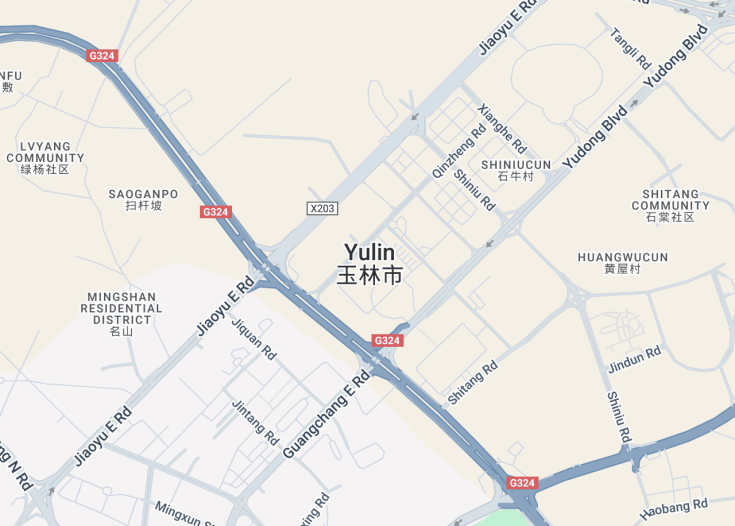Yulin, a historical city in China’s Guangxi Zhuang Autonomous Region, is renowned for its rich cultural heritage and scenic landscapes. It thrives on a harmonious blend of tradition and modernity, offering a wide array of sites from ancient city walls and traditional dwellings to vibrant cultural festivals.
Yulin’s cuisine is a delightful exploration of flavors, particularly noted for its local snacks and street foods. This destination invites travelers to immerse themselves in a truly unique cultural experience, where history and contemporary life seamlessly intertwine.
When visiting Yulin, ensure you attend the local festivals, notably the Yulin Dog Meat Festival, offering profound insights into controversial yet enduring traditions.
To fully appreciate Yulin’s historical depth, plan a visit to the Yuntian Cultural City which beautifully showcases the region’s rich history and arts.
Top things to do & see in Yulin
Select the following sights and activities to discover best tickets and tours available in Yulin.
Yulin: Gateway to the Past
| Country | China |
| Time in Yulin | GMT+8 |
| Language spoken | Mandarin Chinese |
| Population | 1,148,000 (source: China Statistical Yearbook) |
| Currency | Renminbi (¥ / CNY) |
| Airports |
|
Yulin, a city rich with history and culture, is uniquely positioned at the northern edge of Shaanxi Province, China. Known for its majestic Great Wall sections and the ancient charm of its city, Yulin is a fascinating blend of history and modernity. Historically significant as a military fortress, Yulin has played a crucial role in defending the empire against northern invasions. Today, it continues to charm visitors with its well-preserved relic sites and vibrant cultural festivals that echo its storied past.
Adjacent to the expansive Mu Us Desert, Yulin is not just about history. The city is also at the forefront of environmental restoration projects in China, showcasing efforts like the afforestation projects that combat desertification. These initiatives offer a glimmer of hope in the struggle against climate change, making Yulin a model of ecological recovery. Yulin’s economy is also noteworthy. It is a hub for the energy sector, particularly coal and natural gas, which powers not only the city but contributes significantly to the region’s energy needs.
Additionally, Yulin’s local cuisine, especially its noodles and Shaanxi snacks, offers a taste of the unique flavors of northern China. Whether it’s the allure of its ancient walls, the taste of its distinctive culinary delights, or its ecological and economic initiatives, Yulin represents a confluence of the old and the new, making it a compelling destination for travelers looking to experience the depth and breadth of Chinese culture and history.
Where is Yulin?
Located in Shaanxi Province, Northern China, Yulin is a historical fortress city close to the Mu Us Desert.
Distances:
| Route | Distance by car | Time by car |
|---|---|---|
| Beijing to Yulin | 500 mi / 805 km | Approx. 8 hours |
| Xi’an to Yulin | 260 mi / 418 km | Approx. 4 hours 30 minutes |
What is Yulin famous for?
Yulin is renowned for its historical significance with well-preserved sections of the Great Wall, ancient military forts, and vibrant cultural festivals that highlight its rich historical tapestry.
History
Ancient Foundations (Before 1000 AD)
The area now known as Yulin has a recorded history stretching back to ancient times. Originally inhabited by nomadic tribes, it became a crucial outpost on the Northern Silk Road. This strategic position fostered early settlements and a melting pot of cultures, where exchanges between nomads and settlers were commonplace.
The Dynastic Era (1000 AD – 1911)
During the successive dynasties, from the Song to the Qing, Yulin’s importance grew. It served as a military garrison and a key point in defending the empire’s northern borders. The Great Wall’s structures near Yulin underline its defensive significance. Additionally, during the Ming dynasty, the city became an administrative center, further solidifying its role in regional governance and military logistics.
Republican Period and Modern Era (1912 – Present)
The 20th century brought considerable change. Yulin, like much of China, underwent significant transformations during the Republican era and the tumultuous years of the Chinese Civil War. In recent decades, Yulin has leveraged its rich natural resources to develop industries such as coal mining, which has dramatically changed the city’s economic landscape. Despite rapid modernization, Yulin has maintained a rich cultural heritage, visible in its preserved ancient architecture and ongoing cultural festivals.
Visit Yulin
What to see and do in Yulin, China
Yulin, with its rich historical tapestry and vibrant cultural scene, offers a plethora of activities and sights for visitors:
- Explore the Zhen Bei Tai, the largest watchtower of the Great Wall, offering panoramic views of the surrounding landscapes.
- Visit the Yulin Grottoes, a collection of historical caves adorned with ancient Buddhist art.
- Stroll through the old town to experience the traditional architecture and local markets.
- Attend the Yulin International Folk Culture and Art Festival, a celebration of both local and international music, dance, and art.
Festivals and Events in Yulin
Yulin is also known for its vibrant festival scene, particularly the Yulin Dog Meat Festival, despite international controversy. Occurring annually in June, this festival has been a traditional part of Yulin’s cultural heritage but has faced increasing scrutiny and opposition in recent years.
Best time to visit Yulin
The optimal time to visit Yulin is during the spring (April to June) and autumn (September to October) when the weather is mild and pleasant, ideal for outdoor activities and experiencing local festivals.
Is Yulin worth visiting?
Yulin offers a unique blend of natural beauty, historical sites, and rich cultural experiences that make it worth visiting. However, potential visitors should be aware of the environmental impact of local industries and the controversy surrounding the Dog Meat Festival, which may affect the overall travel experience.
Those interested in ancient Chinese history and culture will find Yulin particularly appealing, while others might need to consider the ethical implications of their visit.










